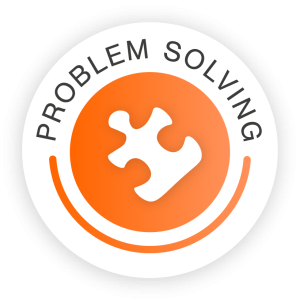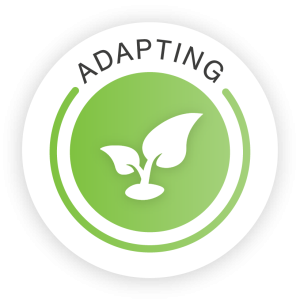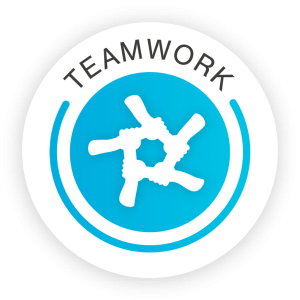
In today’s competitive job market, employers are not only looking for candidates with academic qualifications but also those who possess a range of essential skills.
The Skills Builder Partnership is an excellent resource to get you started.
Here are some essential skills your child should be developing before entering the workplace and how you can help them achieve these;
![]()
Communication: Listening & Speaking

Engage your child in everyday conversations about topics that interest them, encouraging them to express their thoughts and opinions clearly and confidently. Allowing your child to practise articulating their arguments and listening to others’ perspectives at home is a great place to start developing these skills.
Problem-Solving: Finding solutions to challenges

Encourage your child to tackle challenges independently and find creative solutions to problems they encounter. Encourage your child to tackle household chores or DIY projects independently, allowing them to come up with solutions and troubleshoot any issues that arise.
Creativity: Using imagination and generating new ideas

Challenge them to start a blog or YouTube channel about a topic they’re passionate about, finding creative ways to present information. Encourage them to enter writing, art, or Music competitions that require innovative thinking. Creativity comes in many forms, the most important thing here is encouraging something they are interested in.
Adapting: Overcoming challenges and setbacks to achieve goals
 Encourage your child to develop their emotional intelligence by encouraging self-reflection, empathy towards others, and healthy relationships with peers and colleagues. Create a safe space for them to express their emotions and share their experiences especially after conflict situations.
Encourage your child to develop their emotional intelligence by encouraging self-reflection, empathy towards others, and healthy relationships with peers and colleagues. Create a safe space for them to express their emotions and share their experiences especially after conflict situations.
When they face a setback, like not making a sports team or getting a lower grade than expected, guide them in finding lessons learned and making a plan for improvement. Encourage them to keep a gratitude journal, writing down three positive things each day.
Planning: Setting goals and designing routes to achieve them

Help them set a challenging academic goal, like improving their grades in a difficult subject or preparing for advanced placement exams. Support them in pursuing a significant personal goal, such as training for a half-marathon or learning a complex skill like coding or learning to play a new instrument. Encourage your child to identify opportunities for growth and improvement, and to take action without waiting for instructions. Support their interests and hobbies by providing opportunities for them to explore new challenges or pursue independent projects.
Leadership: Supporting, encouraging and motivating others to achieve a shared goal

Encourage them to take on a leadership role in a school club. You could suggest they organise a community service project, like a local park clean-up or a fundraiser for a cause they care about. If they have a part-time job, encourage them to take initiative and propose improvements in their workplace. Even supporting younger siblings and leading the way through teaching younger family members new skills or how to do every day activities is taking the lead.
Teamwork: Working cooperatively with others to achieve a shared goal

Encourage your child to participate in team-based activities, such as group projects, team sports, or volunteering opportunities. Teach them the importance of listening to others, sharing ideas, and resolving conflicts constructively. Involve them in family projects such as holiday planning where they can collaborate with siblings or peers to accomplish tasks and solve problems together.
Digital Literacy
In today’s digital age, digital literacy is crucial for almost every job. Encourage your child to develop their digital skills, including proficiency in using common software programs. Teach them how to do the basics using common software programs like word, excel and powerpoint and encourage them to explore advanced features and functionalities.
Transitioning from adolescence to young adulthood
Workplace Etiquette
Educate your child about common workplace expectations such as punctuality, respect for colleagues, and appropriate behaviour in meetings and other professional settings. Remind them not to interrupt people when they are speaking and to actively listen when others are speaking. Small things like offering to make a hot drink for a colleague who has offered you one earlier goes a long way!
Discuss the importance of being mindful of cultural differences and respecting diversity in the workplace, including differences in communication styles, customs, and traditions. If your child has not had many opportunities to socialise in multicultural settings you may wish to explore this with them and discuss appropriate language.
Help your child understand the importance of maintaining professionalism at all times, even in challenging or stressful situations, and how their behaviour can impact their reputation and relationships with colleagues.
Work Ethic and Attitude
Instil the value of a strong work ethic in your child, emphasising the importance of being reliable, responsible, and committed to their work. Just because they have socialised or had a heavy weekend does not mean they can have a lie in and be late for work! They should book holidays if they need recovery time from weekend trips or activities.
Discuss the significance of having a positive attitude in the workplace, including being proactive, adaptable, and willing to learn and grow. Remind them not to be negative and to talk to their line manager if something is worrying or bothering them rather than letting it fester.
Encourage your child to take initiative and show enthusiasm for their work, demonstrating a willingness to go above and beyond what is expected of them. Examples of this may include; offering to stay late to help with an upcoming event, taking on some extra work to help a busy colleague or helping in a different area of the business during busy periods if they have time.
Remind them that ATTITUDE goes a long way at work and usually trumps experience especially when it comes to school leavers! They have a real opportunity to shine.
Remind them that Cumbria is a small place!
Professional Development
Emphasise the importance of continuous learning and professional development in today’s fast-paced and competitive job market. They will most likely need to keep learning and studying (depending on the field they choose) so they need to be enthusiastic about this and put in the effort.
Encourage your child to seek out opportunities for skill-building, whether it’s through formal education, training programs, or on-the-job experiences. They should be positive about being offered training courses by their employer.
Discuss the value of networking and building professional relationships with mentors, colleagues, and industry professionals to support their career growth and development. If they get the opportunity to accompany senior colleagues to events, business meetings etc they should embrace this and do their best to be professional and engage with people.
Handling Challenges and Setbacks
Prepare your child for the inevitable challenges and setbacks they may face in the workplace, such as criticism, failure, or conflicts with colleagues. This can be very upsetting for both you and your child so being prepared for this will certainly help if it does occur.
Teach them resilience and coping strategies for managing stress and adversity, such as problem-solving skills, positive self-talk, and seeking support from trusted mentors or peers.
Help them understand that setbacks are a natural part of the learning and growth process, and encourage them to approach challenges with maturity.
Try and avoid stepping straight in to solve the problem and encourage them to take steps themselves to fix any issues. Give them the time and attention they need to talk through any problems and coach them on how they could around solving the problem themselves.
Remember, if they are employed in an apprenticeship, this is a real job and you should support them, not act for them.
Seek Support and Guidance
Let your child know that it’s okay to seek support and guidance from trusted mentors, colleagues, or HR professionals if they find themselves caught up in difficult dramas or conflicts in the workplace.
